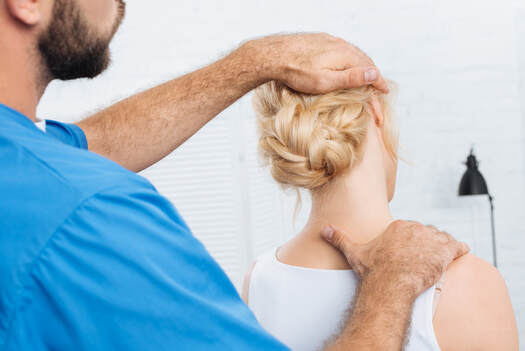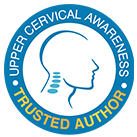upper cervical blogdr. blom Work Specifically in the neck and neck related disorders?
|
|
Living in beautiful Boise, Idaho, is a dream for many. But for those experiencing persistent dizziness, vertigo, or a constant spinning sensation, it can feel like a nightmare. These individuals aren't alone. Thousands of Boiseans suffer from vertigo every year, and it can severely impact their daily lives. But what if there's a natural, drug-free solution that could help them regain their balance and get back to enjoying everything the city has to offer? Dr. Grayson Blom, a Boise ID Chiropractor, has seen firsthand how specialized chiropractic care can make a world of difference for those struggling with vertigo. Dr. Blom understands the frustration of trying various treatments with little success, and he offers a holistic approach that addresses the root cause of the problem. If you're experiencing vertigo in Boise, it's important to understand what it is and how it might be connected to your neck. This article will delve into the causes of vertigo and explain how Boise vertigo chiropractic care could be the missing piece in your journey to a dizziness-free life. Key Takeaways: Signs You Need to Seek a Boise Chiropractor
To learn more about the connection between head and neck injuries and vertigo, download our complimentary e-book by clicking the image below. Common Causes of Vertigo Vertigo isn't a disease itself but a symptom of an underlying condition. It can be triggered by a variety of factors, ranging from inner ear problems to head injuries. Some of the most common causes of vertigo include:
When to Consider Boise Vertigo Chiropractic Care While various factors can cause vertigo, certain signs may indicate that your dizziness could be related to your neck. If you noticed or have the following things, you will likely find relief if you try exploring Boise vertigo chiropractic care:
How Boise ID Chiropractic Can Help with Vertigo Upper Cervical Chiropractic is a specialized field that focuses on the precise alignment of the top two vertebrae in the neck, known as the atlas and axis. These vertebrae are crucial for the proper functioning of the nervous system and the body's balance system. Misalignments in the upper cervical spine, often caused by injuries or wear and tear, can put pressure on nerves, restrict blood flow, and disrupt the signals sent to the brain from the inner ear. This can lead to a variety of symptoms, including vertigo, dizziness, headaches, and neck pain. The benefits of Boise ID Chiropractic care for vertigo can include:
Work with a Professional Boise ID Chiropractor Today!
If you're considering Upper Cervical Chiropractic Care for your vertigo, it's crucial to find a qualified practitioner with experience in this specialized field. Dr. Grayson Blom, located in Boise, is a highly trained and experienced Upper Cervical Chiropractor dedicated to helping patients find relief from vertigo and other related conditions. Our Boise Chiropractor focuses on providing personalized care and utilizing the latest technology to ensure precise and gentle adjustments. He takes the time to understand each patient's unique needs and develops a customized care plan to address their specific concerns. It's important to schedule a consultation with our Boise Chiropractor to determine whether you make a good candidate for atlas adjustment. Doing so will also give you an opportunity to discuss your symptoms, medical history, and treatment goals and to get a feel for the chiropractor's approach and personality. Remember, finding the right chiropractor can make all the difference in your journey to overcoming vertigo. By choosing a qualified and experienced practitioner like Dr. Grayson Blom, you can trust that you're in good hands and on the path to a healthier, happier life. Schedule your consultation today! To schedule a consultation with Dr. Blom, call 208-487-8653, or just click the button below.
0 Comments
It’s a must to get ample sleep at night, especially if you’re already prone to vertigo attacks, to begin with. Find out how you can improve your sleep quality and see the differences it can make to your body and health! If you’re looking for longer-lasting vertigo relief, our Upper Cervical Chiropractor in Boise would be happy to help! Take the first step towards vertigo relief. Call 208-487-8653 or click the button below for a consultation with Dr. Blom.
Have you ever experienced a car accident? Did you notice dizziness, nausea, or loss of balance afterward? Are you finding it difficult to focus or carry out simple tasks due to constant disorientation? You may be suffering from vertigo as a result of a whiplash injury from the accident. The symptoms of vertigo can have a profound impact on your daily life, affecting your ability to work, drive, and carry out mundane routine activities. You may wonder if this is a temporary condition or if it will eventually go away. Some people also seek natural relief for vertigo in Boise to help with their symptoms. Whiplash and vertigo Whiplash is a common injury following a car accident. It happens when the neck and head are rapidly forced backward and forward, causing the cervical spine to overextend. Common symptoms can include neck pain, headaches, and stiffness. In some cases, whiplash can also trigger vertigo, a symptom usually described as a feeling of spinning or whirling despite keeping still. Vertigo can develop immediately after the injury or manifest in several days or weeks. While some people may recover from whiplash and vertigo in a matter of days, others may require longer recovery periods, depending on the severity of the injury. The type of vertigo usually related to whiplash is called cervical vertigo. To learn more about the connection between head and neck injuries and vertigo, download our complimentary e-book by clicking the image below. Cervical Vertigo In A Nutshell Cervical vertigo, also called cervicogenic dizziness, is a type of vertigo caused by a neck injury or disorder, such as whiplash from a car accident. The symptoms of cervical vertigo can include dizziness, loss of balance, nausea, tightness and pain in the neck, and headaches. In addition, neck movement often worsens these symptoms, such as turning the head or looking up. Some patients seeking natural relief for vertigo in Boise report their symptoms started following a car collision incident. Unfortunately, the impact of vertigo can last for months or even years after being involved in an accident. Some may recover after a year, but the symptoms can linger for several years or longer in some severe cases. Upper Cervical Care: The Top Source Of Natural Relief For Vertigo In Boise
It's important to seek proper care if you are experiencing vertigo after a car collision, as underlying neck injuries may require immediate attention. While some people may recover from vertigo symptoms after some time, others may require longer recovery periods, and some may experience chronic symptoms. But with proper care, such as Upper Cervical Care, you can manage your symptoms and improve your quality of life. Upper Cervical Care is a natural approach to help vertigo by restoring the alignment of the atlas and axis bones. Notably, the alignment of these bones can get affected by whiplash injuries sustained in car collisions or other similar events. But thankfully, with the help of a Board Certified Upper Cervical doctor like Dr. Grayson Blom, you can help your misaligned atlas and axis bones shift back in place. Doing so will help alleviate symptoms such as dizziness, nausea, and loss of balance. If you are experiencing vertigo following a car collision, you may benefit from a thorough Upper Cervical Care regimen. We strongly encourage you to book an appointment at our office, and we can help you find relief to manage your symptoms and improve your quality of life. Consult with us today to see how we can help you feel better, overcome your symptoms, and reclaim your life free from pain and discomfort. To schedule a consultation with Dr. Blom, call 208-487-8653, or just click the button below. One of the best ways to ward off vertigo attacks is to ensure your body gets enough vitamins and nutrients. Find out which fruits can help you achieve this and what vitamins you can get from them! Another natural remedy you can try is upper cervical chiropractic. Thousands of patients who have worked with our upper cervical chiropractor in Boise through the years have experienced massive improvements in their balance and vestibular function. Find out more about how that’s possible in our discussion below. Take the first step towards relief. Set a consultation with Dr. Blom by calling (208) 487-8653 or clicking the button below.
For many people, vertigo is not entirely a severe health concern. It may lead to balance problems and dizziness, but the symptom is not life-threatening. However, people should be aware of the dangers and threats associated with vertigo. Despite being a non-life-threatening symptom, it does not mean that you should ignore it altogether and take little to no precautions. So, as your trusted source of vertigo relief in Boise ID we thought of equipping you with everything you need to know about vertigo and the potential dangers you might face during your episode. To jumpstart our discussion, let’s look into the two main categories of a vertigo episode: peripheral and central vertigo. Peripheral Vertigo and Its Typical Causes Peripheral vertigo is connected to a problem in the inner ear that is significant in controlling balance. In most cases, the problem affects organs like the labyrinth, semicircular canals, and vestibular nerves. Here are a few examples of the usual conditions associated with peripheral vertigo:
Central Vertigo and Its Potential Causes The other type of vertigo is central vertigo, which is caused by central nervous problems. Some of the usual causes of this type of vertigo include the following:
When is vertigo dangerous?While vertigo itself is not life-threatening, there are some dangers associated with vertigo attacks that people should be aware of. One of the most significant dangers is the risk of falls and injuries. When people experience a vertigo attack, they can lose their balance and fall. Falls can lead to severe injuries, especially for older adults. Unwanted accidents like this can lead to injury-related deaths in patients, young or old. But those over 65 are at a high risk of severe, paralyzing or lethal injuries. Another danger associated with vertigo is the risk of car accidents. People who experience vertigo attacks may feel dizzy and disoriented while driving. This can lead to accidents. Therefore, drivers experiencing vertigo episodes are advised to take extra precautions as they may be involved in car accidents that can lead to grave results. If you have an outdoorsy lifestyle or are required to be physically fit in your job, experiencing vertigo may feel like the whole world is crumbling. However, finding vertigo relief in Boise ID is possible, and you can reclaim your life back to normal. The first thing is finding the root cause of your vertigo episodes. Work with your doctor to identify what's causing your vertigo to occur. Sometimes injuries sustained many years ago are linked to vertigo attacks. It might help to mention any injury or physical trauma endured in the neck or head, even years before your attack. Ways to Minimize Risk for Injuries Linked to Vertigo Because of the increased danger of falls or accidents due to vertigo attacks, taking extra precautions each time you feel a vertigo episode is coming may be necessary. Below are some vertigo care tips that might benefit you while you seek long-term vertigo relief in Boise ID. #1. Make your environment vertigo-friendly People who experience chronic vertigo episodes may need to make a few adjustments in their living space or work area to make it vertigo-friendly. Changes like using non-skid mats, installing motion-activated lights, keeping your walkway or driveways free from obstructions, or maintaining a dry and non-slippery floor are simple things that can reduce your chances for serious injuries. #2. Make kitchen and bathroom upgrades
These areas in the house are known for accidents. Hence, people with vertigo must make adjustments in these areas to prevent unwanted incidents and minimize risks of slipping or tripping due to wet or moist flooring. Installing safety bars and non-slip rugs may save you from freak accidents. `Keeping these areas clean and dry can help too. Using a step ladder in the kitchen to reach stuff from your high shelves can also prevent you from losing balance or falling. Ensure the step ladder is stable and always in good condition before use. #3. Seek help from trusted loved ones. Seeking help from family and friends may be necessary to get better assistance, especially during severe vertigo episodes. This also ensures you're not left out for yourself in case of emergency. #4. Avoid activities during a vertigo attack You increase your chance of injury or getting into an accident when you move around during vertigo attacks. You can also pose more danger to people around you. So it's best to avoid activities such as driving. Likewise, walking or commuting to work while feeling nauseated or having uncontrolled eye-jerking movements can lead to falls or trips. When you notice vertigo's accompanying symptoms, we recommend staying put and waiting for the episode to pass. The fewer movements you make, the better your chances of preventing a severe injury. This can also help you minimize your spinning sensations, especially if they stem from BPPV, an inner ear problem that worsens with movement. #5. Seek Upper Cervical Care for Vertigo Relief in Boise ID Many patients swear by the comfort they experience after upper cervical chiropractic adjustments for long-lasting vertigo relief. However, you may not be aware that your upper cervical bones may have shifted from their alignment. When misalignments occur, you become highly susceptible to developing health problems like vertigo episodes. Misalignments cause your nerves and brainstem to perform at their best; hence, your brain receives mixed signals. The misaligned cervical bones can also cause failed fluid drainage, aggravating vertigo-causing disorders such as Meniere's. If this is the underlying cause of your vertigo, the only recommended solution is to restore the balance and alignment of your bones. Otherwise, you will continue to experience vertigo episodes. Upper cervical care is a gentle and safe approach that focuses on restoring your upper cervical spine balance. It's been helping patients with recurring vertigo eliminate or reduce their spinning sensations and other symptoms. And this method is safe for children and adults alike. Get your upper cervical spine checked at Upper Cervical Health Centers Boise under the care of Dr. Blom. Call (208) 559-0541 or the online contact form to schedule an appointment. Through slow yet precise adjustments, your compressed or irritated brainstem and nerves can return to their optimum health and function properly again. Restore balance in your nervous system. Call us today! To schedule a consultation with Dr. Blom, call 208-559-0541, or just click the button below. Vertigo causes a false sense of motion. It can happen without warning and make daily activities seem mentally and physically taxing. Here are some things you can try at home to help reduce the occurrence of your vertigo episodes. Also, we shared about an effective source of vertigo relief in Boise that can potentially redefine your approach to healing the body. Take the first step towards relief. Set a consultation with Dr. Blom by calling 208-559-0541 or clicking the button below.
As a chiropractor, Dr. Grayson Blom often hears recurring concerns from patients diagnosed with Meniere's disease. Notably, many wonder how long their condition will last or how long they must wait to experience Boise ID vertigo relief. Some studies found that Meniere's can persist for up to 41 years. Researchers also found that there are distinct stages that can indicate how far the condition has progressed. Are you familiar with these phases? If not, we strongly suggest going through our blog post and learning how you can potentially achieve lasting Boise ID. vertigo relief. Stages of Meniere's Disease Meniere's disease is a condition that affects one's inner ear and causes vertigo (uncontrollable spinning), tinnitus, and hearing loss. Hearing loss in Meniere's disease occurs due to an accumulation of fluid and changes in pressure in the inner ear. Hearing loss can affect low-frequency and high-frequency sounds, making speech sound muffled or slurred. These symptoms tend to worsen over time as a patient goes through the different stages. Let’s take a closer at the phases of Meniere’s disease below. Early Stage - Fullness in the ear, tinnitus, and mild vertigo As mentioned earlier, the primary symptoms of Meniere's disease are hearing loss, tinnitus (ringing in your ear), and vertigo. While these symptoms can vary in severity from person to person, they most often start mild and slowly progress over time. The first symptom you may experience is a fullness or pressure in your ear. People who have had Meniere's disease describe this sensation as feeling like their ears are clogged with water. This sense of fullness can also come with tinnitus – a symptom that causes you to hear ringing sounds in your ear. These initial signs of Meniere's disease usually affect only one ear. But sadly, some people experience the same symptoms on both sides later on. Besides the health concerns we listed above, we suggest looking out for other signs of Meniere's disease, including:
Phase 1 - Vertigo lasting longer than 20 minutes but no more than 24 hours with fluctuating hearing loss The first phase of Meniere’s disease rarely cause complete hearing loss. However, it can set off vertigo episodes that can last anywhere from 5 to 20 minutes. If you have a vertigo episode during this specific stage, it is essential to rest, preferably in a quiet and darkened room. If you notice hearing problems, you may consult with your doctor about diet modifications and medications needed to control or lessen the severity of your symptoms. By doing so, you can gauge the level of patient care you need and identify which source of Boise ID vertigo relief options you should try. To learn more about the connection between head and neck injuries and vertigo, download our complimentary e-book by clicking the image below. Phase 2 - Attacks of vertigo lasting longer with increased hearing loss
As the disease progresses, your vertigo attacks will last longer than 24 hours, and you find yourself experiencing dizziness episodes for days, not just hours. You may also begin to experience fluctuating hearing loss and increasing tinnitus. This makes MD patients feel more anxious, depressed, and exhausted because of their symptoms. This specific stage requires immediate intervention to prevent the symptoms from getting worse. Some of the common interventions used at this point include the following:
Phase 3 - No attacks of vertigo but progressive hearing loss The absence of vertigo attacks typically characterizes the third phase. However, it would help if you still be wary of milder or shorter vertigo episodes. Progressive hearing loss continues that can lead to total deafness in your affected ear. The dizziness associated with this phase is not as intense as in previous phases and may last for a couple of days instead of only a few minutes. Phase 3 may continue for years without further progression or linger for the rest of your life. Most Recommended Boise ID Vertigo Relief: Upper Cervical Chiropractic When you have Meniere's disease, you likely experience vertigo and loss of hearing. And it would help if you reached out to an upper cervical doctor for Boise ID vertigo relief. Upper cervical chiropractic can help manage not just the progression of this condition but also the debilitating symptoms that come with it. The primary objective of chiropractic is to improve the function of the inner ear through spinal correction and suggest some lifestyle changes to work hand-in-hand with the adjustments. Dr. Grayson Blom is an Idaho upper cervical doctor who leads the Upper Cervical Health Centers Boise. Initially, Dr. Blom was also a patient who complained about recurring health concerns until he found chiropractic care. Since he knows firsthand the plights and pains caused by misalignments and unhealthy spine structure, he and his team wish to share their practice to help people achieve lifetime health and wellness in the most natural way possible. So if you are looking for a clinic or chiropractor that knows what you are going through and sincerely wants to help you recover and better manage your condition for a happier life, visit Upper Cervical Health Centers Boise. You may schedule your appointment with us by calling (208)-559-0541 or filling out our online form. To schedule a consultation with Dr. Blom, call 208-559-0541, or just click the button below. Vertigo is so common that it is often overlooked because many people find the sensation indescribable. Let’s go through a few signs that denote a vertigo problem. As your trusted chiropractor in Boise, a natural way to deal with recurring issues with vertigo is definitely recommended. Visit our clinic today or schedule your appointment with Dr. Blom by calling 208-559-0541 or just by clicking the button below.
Do you remember the first time you had a BPPV (also called positional vertigo) attack? Did you see a doctor to get immediate vertigo relief in Boise ID? It surely was a terrifying experience. Anything unfamiliar and out of your body’s control--like the sudden spinning sensation of vertigo--can make you feel unwell in an instant. Benign Paroxysmal Positional Vertigo (BPPV) can send a chill down your spine, but it is not as severe as you might think. The word benign in its name is a dead giveaway that BPPV is not that serious and lethal of a condition. However, the symptoms it causes to your body can be bothering and tormenting. This blog will guide you on managing BPPV when its symptoms start to attack. However, before we get to the management tips, let us first understand what BPPV is and how it affects your inner ear. A Rundown of BPPV When finding vertigo relief in Boise ID, you must first know what is causing your debilitating vertigo. One of the top inner ear diseases that cause episodes of vertigo is BPPV. Loose Ear Crystals Are Said to Cause BPPV The inner ear works to keep our balance and help us hear. BPPV exists when ear rocks or calcium crystals move away from the utricle (part of the ear responsible for sensory reception) and stay in the center canal of the inner ear--where they shouldn’t be. As the crystals come loose and try to settle in the wrong region in the inner ear, the brain gets false messages from your ear that you are violently rotating. You start to feel the effect when you move your head or turn your body too suddenly. That’s why many feel an attack when they roll over in bed or look up or down. To learn more about the connection between head and neck injuries and vertigo, download our complimentary e-book by clicking the image below. Take These Steps to Overcome BPPV Attacks Benign paroxysmal positional vertigo can bring a whole lot of unpleasant feelings. Although the condition is benign, its vertigo symptoms can cause panic, anxiety, and stress--especially when the attack happens in public. If you are worried about how you can escape BPPV’s debilitating effects, then these tips can help you. 1. Don’t panic but be aware Vertigo attacks can cause intense fear and panic. Panic may then lead to stress, making your condition much worse. So, if you experience a BPPV attack in public or at home, be sure to stay calm. For a brief moment, you may think that the spinning sensation won’t stop, but remember that it will only last for a couple of seconds to a minute. So, what shall you do instead? Calmy stabilize and rest your head. Then, fix the focus of your eyes to one thing. These will help relieve the whirling feeling quickly. 2. Ask for help If you have a vertigo attack anywhere and you can’t afford to get up, try asking for help. This tip is essential, especially if the attack occurs in public or when you are alone. If you are not comfortable asking for help from a loved one or a stranger, try calling a healthcare provider. They know best how to help you manage your symptoms. Your doctor or physical therapist can also prescribe exercises and medications that are appropriate for your BPPV. 3. Pull over when you happen to be driving Many patients with BPPV are unprepared for sudden vertigo attacks while driving. Driving with poor vision at night can cause eye strain and loss of focus. These things can cause stress and make the brain exhausted, leading to feelings of vertigo. So, when you start to feel your body getting light and your vision getting blurry, be sure to pull over immediately. Do this before your vertigo episode to avoid further harm on the road. Additionally, you can call a friend or a family member to drive you back to your place for a safer ride. 4. Perform Epley maneuver at home The Epley maneuver is an excellent and simple exercise to manage BPPV at home. It aims to move the calcium crystals back to their original position in the inner ear. Performing this exercise can then relieve vertigo symptoms caused by BPPV. 5. Get upper cervical chiropractic care Getting upper cervical chiropractic care is a form of therapy that can keep your BPPV symptoms at bay. This precise, safe, and gentle way of addressing the root cause of BPPV offers vertigo relief in Boise ID. An upper cervical chiropractor corrects a common underlying cause of vertigo--a misalignment in the upper neck. The C1 and C2 bones in the upper neck can misalign due to an injury, disc degeneration, and even stress. Your upper neck and inner ear are closely related to each other. Therefore, any problem in the upper neck can affect the function of your inner ear. Neck adjustments facilitated by an upper cervical chiropractor can correct this error and lead you back to optimal health. The Secret to Getting Vertigo Relief in Boise ID Upper cervical chiropractic care can be the natural and long-lasting solution for BPPV. This care is available here at Upper Cervical Health Centers Boise. We have an excellent team who can provide your upper neck the relief and care it deserves. Dr. Grayson Blom is committed to restoring your health and giving you another shot at living a vertigo-free life. Take the first step towards relief. Set a consultation with us. You may book an appointment or call our office at (208) 559-0541. To schedule a consultation with Dr. Blom, call 208-559-0541, or just click the button below. Vertigo is an extremely common issue, especially for those over the age of 40. However, today we are going to focus specifically intense and repeating episodes of vertigo. It is none other than persistent postural perceptual dizziness or PPPD. What is PPPD? Who gets it? How is it caused? Is there any hope for sufferers? We’re about to provide you with everything you need to know about this debilitating form of vertigo, including a natural way to find relief. Read on to find out what it takes to lead a life free from vertigo with the help of a 83705 chiropractor. PPPD can certainly affect your life if you don't find a way to manage it better. Learn how our 83705 Chiropractor can help you restore balance in your life. Call us at (208) 559-0541 for an appointment with Dr. Grayson Blom.
|
Dr. BlomUpper Cervical Chiropractor Categories
All
Archives
February 2024
|























 RSS Feed
RSS Feed


